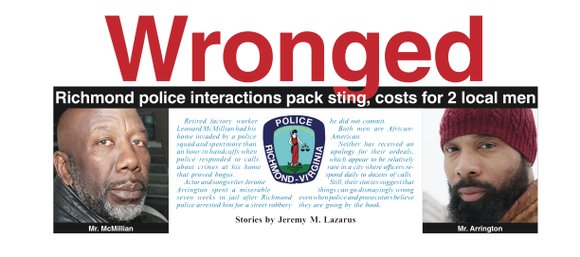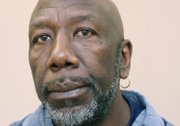Wronged
Jeremy M. Lazarus | 2/19/2015, 6:02 p.m.

Phony call results in police invasion of his home, handcuffs
Leonard McMillian knows that being a black man in Richmond can bring unexpected trouble.
The retired factory worker has never been charged with a crime. But since moving to Richmond 14 years ago, “the greatest threat to my survival has been the Richmond police,” he says.
City police officers have stopped him and pointed guns at his head because his vehicle resembled the vehicle a shooter was using, he recalled.
Mr. McMillian, 57, also talked about being pulled over by police after he distributed free vegetables in Gilpin Court. Officers jumped into his vehicle and searched it without permission while another officer detained him, he said.
In another incident, he said he was stopped and handcuffed by an officer who told Mr.
McMillian he was being detained because the license numbers on the garden equipment trailer he was pulling were “close” to those on a trailer reported stolen.
He also has been stopped while walking his dog because the officer said he fit the description of someone involved in a domestic dispute.
However, Mr. McMillian said nothing tops Oct. 28, 2014, when city police officers forced their way into his North Side home after being called to investigate what they were told was a violent domestic dispute — even though the complaint would prove to be a malicious prank.
“I felt I was dealing with mad men,” he said of the surreal experience — an example of what can happen when police unquestioningly assume that the information received from 911 calls is always truthful and accurate.
He appeared before City Council last week to speak about what happened and was quickly referred to a police officer who took his information and referred it to a superior. However, Mr. McMillian already has been notified that the department has deemed the officers acted appropriately after an internal affairs review of his complaint.
Here’s what he said happened:
It was around 4 a.m. when seven police officers arrived at the darkened, silent, neatly tended brick house and began pounding at the door. Mr. McMillian said he and his wife of 34 years were asleep on the second floor, while his visiting son was asleep in a basement bedroom.
Awakened, Mr. McMillian said he went downstairs to investigate the loud knock- ing. He said he opened the door after those knocking identified themselves as police officers who had come to investigate a “domestic dispute.”
He said he told the officers to wait outside while he got his wife, only to have three of the officers push him aside and enter his living room. The fact that everything was in place in the room and the adjacent dining room did not seem to register, Mr. McMillian said.
Mr. McMillian said he was bullied when he protested their entry. Instead of courtesy, he said an officer twisted his arm and forced him down on the sofa where he was left handcuffed. He was told, he said, that he would be shot with a taser if he kept asking for a lawyer or to see a supervisor.
Then, he said, after the officers pounded on the wall, his wife, a sound sleeper, came downstairs to the shocking sight of her husband.
She was able to convince the officers to release her husband and to leave their home when it became obvious she had no injuries and that the 911 call about the dispute had been placed from a cell phone neither she nor anyone else in the house owned, he said.
Upset, Mr. McMillian drove to police headquarters to file a complaint about what he regarded as a brutal assault and entry without a search warrant.
While he was there, he got a frantic call from his wife. The police had returned and were surrounding the house, claiming that the incident had escalated “into a kidnapping and hostage situation,” he said.
When he returned home, he found his wife had barred entry to the officers unless they produced a search warrant, and they were threatening to bring in a SWAT team to force entry and to arrest her for impeding their investigation. The standoff went on for more than an hour.
“I was handcuffed and detained on the porch,” he said. “It was embarrassing and humiliating. My neighbors were coming out to go to work and children were passing by on their way to school. And there I was handcuffed like a criminal, with police cars everywhere.”
Finally, he said officers responded to his suggestion “to call the number where the calls have been coming from.”
And suddenly it was all over, after the person who answered said her name was “Ashley” and hung up. It was obvious the phone was not inside the McMillians’ home, and that police had been responding to another phony call.
He said a sergeant only added insult to injury by telling Mr. McMillian how well he had been treated: “I didn’t pull my gun out, did I?”
Mr. McMillian is still furious about the invasion and even more so that the department has dismissed his complaint.
“What did I do to justify being strong- armed by officers who are supposed to protect me? This is just not right.”
7-week jail ordeal ends when case against him collapses 
Most people believe they cannot be arrested if they have done nothing wrong.
Jerome Arrington is a lesson in how wrong that belief can be.
Before his nightmare began, he appeared to have his life on track.
Fresh from earning a two-year degree at a community college, the 41-year-old lanky, bearded Richmond native had found a job at the Amazon warehouse in Chesterfield County, his first steady work in five years.
Even better, he was starting to achieve his goals as an actor, songwriter and fashion model.
Under his stage name, Foree Shalom, he secured a starring role as the bad guy in a new TV crime drama, “Precinct 757,” airing on Cox Cable in Hampton Roads. And he had started a nonprofit musical association of new artists called Poor Family to raise money for the less fortunate.
None of that mattered Oct. 22, 2014, when Richmond Police Detective P.E. Riddle came to his Chesterfield County residence and arrested him for a robbery. It was an arrest that would turn Mr. Arrington’s life upside down and ultimately prove to have no basis.
For Mr.Arrington, whose arrest record shows convictions only for speeding and other traffic offenses, this arrest was completely bewildering, terrifying and scary. So was the charge.
“Why would I rob someone for a few dollars?” Mr. Arrington told the Free Press last week in discussing the tumultuous experience he had gone through. “I was working. I had money in the bank. If I needed money, I could have just gone to the nearest ATM. This made no sense.”
But his bank account and work history made no difference to Detective Riddle.
Detective Riddle has not been available for comment, and the Richmond Police Department is not commenting on a case that raises questions about the quality of its investigations. Nor is Richmond Commonwealth’s Attorney Michael N. Herring, whose office prosecuted the case.
Incoming Police Chief Alfred Durham, without talking about the case, said in an interview Wednesday with a Free Press reporter, “I believe in getting all the facts” when presented with allegations about police wrongdoing. “There are three sides to every story: There’s your side, my side and then there’s the truth.”
Back in October, the detective had no doubt he had nabbed the right person.
According to the warrant and other information, the detective was certain that Mr. Arrington was the man who had jumped out of a gray car and robbed a man of a few dollars near Hull and Pilkington streets around 4 a.m. Sept. 21.
Mr. Arrington said the detective told him that he and his car, a 1997 gray Buick LeSabre, had been identified through some kind of lineup, though Mr. Arrington said he was never put in a physical lineup.
The evidence against him seemed to mount when Mr. Arrington told police he thought he might have been in Atlanta filming an independent movie when the robbery occurred — an alibi that quickly evaporated when it was checked.
Unable to account for his whereabouts, Mr. Arrington was locked up in jail without bond — labeled by police as a violent criminal.
Indeed, at a bond hearing, an assistant commonwealth’s attorney told a judge that Mr. Arrington was too dangerous to release, claiming that his car had been identified at an attempted robbery after the initial robbery.
His stay in jail cost him his job and wiped out his savings, things that are commonplace for people who are arrested and remain stuck behind bars.
Mr. Arrington had had brushes with the law years earlier, but nothing like this.
He wouldn’t be a robber, he said, because he knows what it’s like to be robbed. He was seriously wounded in 1994 when a would-be robber shot him as he tried to escape.
“I wouldn’t wish that on no one. I wouldn’t put anyone else through that kind of trauma,” he said.
He couldn’t fathom how he became a target of the investigation. He said he never had frequented the area where the robbery occurred and not at 4 a.m. He said his only connection with that section of South Richmond is a relative who lives a few blocks away and whom he occasion- ally visits.
Still the prosecutor, Jamie H. Blackmon, was certain he had a slam-dunk case. In a report to Mr. Arrington’s lawyer on Dec. 9, Mr. Blackmon insisted he was “unaware of any exculpatory evidence” that could clear Mr. Arrington.
Just two days later, Mr. Blackmon was forced to drop the case.
The reason: The robbery victim got his first look at Mr. Arrington and told Mr. Blackmon he had never seen Mr. Arrington before — that he was not the robber.
Suddenly, Mr. Arrington was an innocent man again, with a judge ordering his record expunged of the arrest.
He has never received an apology from the prosecutor or the detective. And he’s still trying to recover from his losses. He remains a member of the cast of “Precinct 757,” but his time in jail was costly otherwise. He is still looking for full-time work.
“I don’t know why this happened to me,” Mr. Arrington said. “It was a terrible ordeal. I lost my job, and I missed opportunities for independent acting jobs while I was in jail. I was a victim of a poor investigation.
“I believe I was racially profiled. I want to know why the detective said I was picked out of some kind of lineup for a crime I never committed.”








